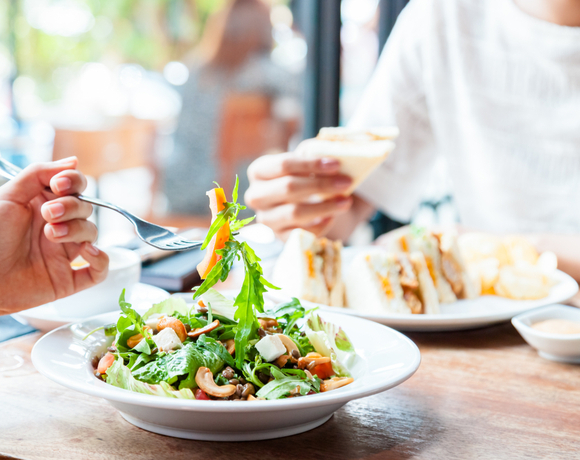
Challenge
Some college students may be entering college with a foundational knowledge in nutrition, but many will enter the higher education environment uncertain in how to apply the information. Studies have been completed to observe the effects of interventions on eating and purchase behaviors on college campuses. Results from these studies reveal that interventions have been effective in increasing sales of healthful items while also decreasing the consumption of less nutrient-dense items 1,2. It is the clients’ goal to ensure students are able to make healthful food choices that are appropriate for their health goals.
Solution
In an effort to increase wellness initiatives within the dining program on campus, and to improve healthful food choices, the Dietitian Meal Deal (RDMD) Rewards Program was created. The program provides guests with an incentive to purchase healthful meal combos by offering rewards in addition to allowing guests to make quick, informed, and healthy food choices. The program first launched in the middle of the Spring 2018 semester. Due to positive verbal feedback from guests, the RDMD Rewards Program was re-launched in the Fall 2018 semester.
“This provides students, who are looking for help in making good food choices, a structured way to do that. UMBC is always trying to bring health to the forefront of campus culture and this program adds to that.” – Dr. Kim Leisey, Associate Vice President of Student Affairs
In order to participate in the program, guests must be enrolled in a meal plan and purchase an RDMD combo from a participating retail location. Upon purchasing an RDMD combo, guests will receive a punch card to complete. One RDMD combo equates to one “punch”, and after six RDMD combos are purchased, students will submit the card to a cashier with their name and student ID and are rewarded with $7 deposited in their dining account.

Meal combinations in the program were selected using a set of criteria, which stemmed from the Chartwells Higher Education’s (CHE) BalancedU criteria. The calorie requirement was modified to reflect the varying health needs and goals in different individuals. A fiber criterion was also included due to its known healthful benefits. The final criteria for a combo meal are as follows:
- 600-800 cal
- <= 5 g saturated fat
- >= 5 g fiber
- 600-800 mg sodium
Results
An estimated 70 cards were distributed to guests and at the end of the Fall 2018 semester, a total of 40 completed cards were submitted, equating to 240 healthful meal combos purchased just in this program. As the program grows and continues into the next semester, the number of sales of RDMDs will be tracked with new POS buttons added to cash registers specifically for the program.
- 100% of meals sold met Balance U nutrition criteria
- 57% of RDMD cards submitted by Fall 2018
Resources:
1) Brown, Mary V., et al. “The Effects of a Nutrition Education Intervention on Vending Machine Sales on a University Campus.” Journal of American College Health, vol. 62, no. 7, 2014, pp. 512–516., doi:10.1080/07448481.2014.920337.
2) Hua, Sophia V., et al. “Health Promotion and Healthier Products Increase Vending Purchases: A Randomized Factorial Trial.” Journal of the Academy of Nutrition and Dietetics, vol. 117, no. 7, 3 Feb. 2017, pp. 1057–1065., doi:10.1016/j.jand.2016.12.006.
For more information on success stories, please contact us!


